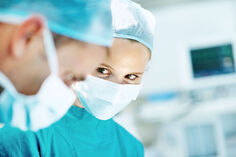AG Chamulitrat
Oxidative metabolic events in liver disease and cancer: from mechanisms to therapeutic approaches
Team
Wissenschaftliche Mitarbeiter
RESEARCH OPPORTUNITIES FOR STUDENTS
Medical students who are interested in pursuing dr. med. in experimental medicine with the focus on phenotyping transgenic mice are welcomed to our laboratory. It is best to contact us long a head of time for project availability. Strong background and interests in lipid biochemistry will be helpful in writing dr. med. thesis.
RESEARCH PROJECTS
In the past 15 years, research work in AG Chamulitrat has evolved from projects on NADPH oxidase1 (Nox1), antioxidant dehydrosilybin, and development of bile-acid phospholipid conjugates (UDCA-LPE) for treatment of liver disease. Cell cultures and hepatocytes/Kupffer cells isolated from mice have been extensively used in laboratory for in vitro studies. Efficacy and pharmacokinetics of UDCA-LPE was tested in vivo by using acute liver injury models (galactosamine/LPS, anti-Cd95 antibody) and chronic fatty liver (NAFLD) models (feeding with high-fat diet or methionine-choline deficient diet). By using profiling of fatty acids and phospholipids, we were able to understand the mechanisms of how UDCA-LPE could alter liver lipids hence altering NAFLD pathogenesis. Extensive studies on UDCA-LPE appear in many Chamulitrat publications in PUBMED.
Nearly all of our projects involve the use of knockout mice with inactivation of genes related to metabolisms of phospholipids (i.e., PLA2G6) and fatty acids (i.e., FATP4). Some mechanistic studies are also carried out by using stable knockout cell lines and isolated cells from transgenic mice. In addition of profiling of lipids, we phenotype our transgenic mice under various stress conditions with approved license in all of our mouse experiments. Identification of phenotypes with respect of gene inactivation and stress-treatment is in many ways the same as the diagnosis of patients in the clinic. Such phenotyping will help build a rationale with specific targets for therapy development. Understanding systems biology by studying transgenic mice may be most useful to prepare medical students for future clinical work and patient treatment.
PHENOTYPING IPLA2B-NULL MICE AND TISSUE-SPECIFIC PLA2G6 Knockout-MICE
Calcium-independent phospholipase A2 (iPLA2b or group VIA Pla2 or PLA2G6) is a ubiquitously expressed gene. It hydrolyzes phospholipids at sn-2 position to generate lysophospholipids and a fatty acid. We have characterized whole body iPLA2b-deficient (iPLA2b-null) mice in various stress models including non-alcoholic fatty liver disease, autoimmune hepatitis (see publications below). The project on iPLA2b-null mice was funded by the DFG.
We have recently been able to generate hepatocyte and macrophage-specific Pal2G6-deficient mice. Their phenotypes are being investigated and there are possibilities for dr. med. thesis for medical students. DFG funding is being requested for these studies.
Our publications on iPla2b-null and tissue-specific Pla2g6 KO mice:
Lukas Klement, Chutima Jansakun, Bin Yan, Simone Staffer, Sabine Tuma-Kellner, Sandro Altamura, Martina Muckenthaler, Uta Merle, Walee Chamulitrat. Myeloid-specific deletion of group VIA calcium-independent phospholipase A2 induces pro-inflammatory LPS response predominantly in male mice via MIP-1α activation. Biochim Biophys Acta Mol Basis Dis. 2024 Jan 9;1870(3):167016.
Chutima Jansakun, Warangkana Chunglok, Sandro Altamura, Martina Muckenthaler, Simone Staffer, Sabine Tuma-Kellner, Uta Merle, Walee Chamulitrat. Myeloid- and hepatocyte-specific deletion of group VIA calcium-independent phospholipase A2 leads to dichotomous opposing phenotypes during MCD diet-induced NASH. Biochim Biophys Acta Mol Basis Dis. 2023 Jan 1;1869(1):166590.
Adriana Andrade, Tanja Poth, Alexander Brobeil, Uta Merle, Walee Chamulitrat. iPLA2β-Null Mice Show HCC Protection by an Induction of Cell-Cycle Arrest after Diethylnitrosamine Treatment. Int J Mol Sci. 2022 Nov ;23(22):13760.
Heng Yeng Wong, Monika Langlotz, Hongying Gan-Schreier, Weihong Xu, Simone Staffer, Sabine Tuma-Kellner, Gerhard Liebisch, Uta Merle, Walee Chamulitrat. Constitutive oxidants from hepatocytes of male iPLA2β-null mice increases the externalization of phosphatidylethanolamine on plasma membrane. Free Radic Res. 2021 Jun;55(6):625-633.
Walee Chamulitrat, Chutima Jansakun, Huili Li, Gerhard Liebisch. Rescue of Hepatic Phospholipid Remodeling Defectin iPLA2β-Null Mice Attenuates Obese but Not Non-Obese Fatty Liver Biomolecules 2020;10(9):1332.
Ann-Christin Otto, Hongying Gan-Schreier, Xingya Zhu, Sabine Tuma-Kellner, Simone Staffer, Alexandra Ganzha, Gerhard Liebisch, Walee Chamulitrat. Group VIA phospholipase A2 deficiency in mice chronically fed with high-fat-diet attenuates hepatic steatosis by correcting a defect of phospholipid remodeling. Biochim Biophys Acta Mol Cell Biol Lipids. 2019;1864(5):662-676.
Xingya Zhu, Hongying Gan-Schreier, Ann-Christin Otto, Yuting Cheng, Simone Staffer, Sabine Tuma-Kellner, Alexandra Ganzha, Gerhard Liebisch, Walee Chamulitrat. iPla2β deficiency in mice fed with MCD diet does not correct the defect of phospholipid remodeling but attenuates hepatocellular injury via an inhibition of lipid uptake genes. Biochim Biophys Acta Mol Cell Biol Lipids. 2019;1864(5):677-687.
Yanan Ming, Xingya Zhu, Sabine Tuma-Kellner, Alexandra Ganzha, Gerhard Liebisch, Hongying Gan-Schreier, Walee Chamulitrat. iPla2β Deficiency Suppresses Hepatic ER UPR, Fxr, and Phospholipids in Mice Fed with MCD Diet, Resulting in Exacerbated Hepatic Bile Acids and Biliary Cell Proliferation. Cells. 2019;8(8):879.
Anna Zakrzewicz, Katrin Richter, Dariusz Zakrzewicz, Kathrin Siebers, Jelena Damm, Alisa Agné, Andreas Hecker, J Michael McIntosh, Walee Chamulitrat, Gabriela Krasteva-Christ, Ivan Manzini, Ritva Tikkanen, Winfried Padberg, Sabina Janciauskiene, Veronika Grau. SLPI Inhibits ATP-Mediated Maturation of IL-1β in Human Monocytic Leukocytes: A Novel Function of an Old Player. Front Immunol. 2019;10:664.
Siebers K, Fink B, Zakrzewicz A, Agné A, Richter K, Konzok S, Hecker A, Zukunft S, Küllmar M, Klein J, McIntosh JM, Timm T, Sewald K, Padberg W, Aggarwal N, Chamulitrat W, Santoso S, Xia W, Janciauskiene S, Grau V. Alpha-1 Antitrypsin Inhibits ATP-Mediated Release of Interleukin-1β via CD36 and Nicotinic Acetylcholine Receptors. Front Immunol. 2018;9:877.
Li Jiao, Hongying Gan-Schreier, Xingya Zhu, Wang Wei, Sabine Tuma-Kellner, Gerhard Liebisch, Wolfgang Stremmel, Walee Chamulitrat. Ageing sensitized by iPLA2β deficiency induces liver fibrosis and intestinal atrophy involving suppression of homeostatic genes and alteration of intestinal lipids and bile acids. Biochim Biophys Acta Mol Cell Biol Lipids. 2017;1862(12):1520-1533.
Xiuling Deng, Jiliang Wang, Li Jiao, Tanyarath Utaipan, Sabine Tuma-Kellner, Gerd Schmitz, Gerhard Liebisch, Wolfgang Stremmel, Walee Chamulitrat. iPLA2β deficiency attenuates obesity and hepatic steatosis in ob/ob mice through hepatic fatty-acyl phospholipid remodeling. Biochim Biophys Acta. 2016;1861(5):449-61.
Johannes Inhoffen, Sabine Tuma-Kellner, Beate Straub, Wolfgang Stremmel, Walee Chamulitrat. Deficiency of iPLA₂β Primes Immune Cells for Proinflammation: Potential Involvement in Age-Related Mesenteric Lymph Node Lymphoma. Cancers (Basel). 2015;7(4):2427-42.
JLi Jiao, Hongying Gan-Schreier, Sabine Tuma-Kellner, Wolfgang Stremmel, Walee Chamulitrat. Sensitization to autoimmune hepatitis in group VIA calcium-independent phospholipase A2-null mice led to duodenal villous atrophy with apoptosis, goblet cell hyperplasia and leaked bile acids. Biochim Biophys Acta. 2015;1852(8):1646-57.
Li Jiao, Johannes Inhoffen, Hongying Gan-Schreier, Sabine Tuma-Kellner, Wolfgang Stremmel, Zhiwei Sun, Walee Chamulitrat. Deficiency of Group VIA Phospholipase A2 (iPLA2β) Renders Susceptibility for Chemical-Induced Colitis. Dig Dis Sci. 2015;60(12):3590-602.
PHENOTYPING TISSUE-SPECIFIC FATP4 KO IN HYPERLIPIDEMIA AND IMMUNITY
Fatty acid transport protein4 (FATP4) is an acyl-CoA synthetase involving in activation of fatty acids to specific metabolic processes in a tissue-dependent manner. FATP4 is upregulated in acquired obesity and its polymorphisms are associated with blood lipids and insulin resistance. Therefore, we have focused our studies to determine FATP4 in a tissue specific manner in non-alcoholic fatty liver disease and steatohepatitis. We have phenotypted adipose- and liver-specific FATP4 KO mice and demonstrated a key role lipolysis of tissue triglycerides TG. We currently are studying intestine- and macrophage-specific Fatp4 KO mice.
Our work and collaboration publications on Fatp4 KO:
Huili Li, Jessica Seessle, Simone Staffer, Sabine Tuma-Kellner, Gernot Poschet, Thomas Herrmann, Walee Chamulitrat. FATP4 deletion in liver cells induces elevation of extracellular lipids via metabolic channeling towards triglycerides and lipolysis. Biochem Biophys Res Commun. 2023 Dec 20:687:149161.
Deniz Göcebe, Chutima Jansakun, Yuling Zhang, Simone Staffer, Sabine Tuma-Kellner, Sandro Altamura, Martina U Muckenthaler, Uta Merle, Thomas Herrmann, Walee Chamulitrat. Myeloid-specific fatty acid transport protein 4 deficiency induces a sex-dimorphic susceptibility for nonalcoholic steatohepatitis in mice fed a high-fat, high-cholesterol diet. Am J Physiol Gastrointest Liver Physiol. 2023 May 1;324(5):G389-G403.
Huili Li, Thomas Herrmann, Jessica Seeßle, Gerhard Liebisch, Uta Merle, Wolfgang Stremmel, Walee Chamulitrat. Role of fatty acid transport protein 4 in metabolic tissues: insights into obesity and fatty liver disease. Biosci Rep. 2022 Jun 30;42(6):BSR20211854.
Yuling Zhang, Ning Wu, Hongying Gan-Schreier, Feng Xu, Sabine Tuma-Kellner, Simone Staffer, Jessica Seeßle, Uta Merle, Walee Chamulitrat. FATP4 inactivation in cultured macrophages attenuates M1- and ER stress-induced cytokine release via a metabolic shift towards triacylglycerides. Biochem J. 2021 May 28;478(10):1861-1877.
Yuting Cheng, Hongying Gan-Schreier, Jessica Seeßle, Simone Staffer, Sabine Tuma-Kellner, Denis Khnykin, Wolfgang Stremmel, Uta Merle, Thomas Herrmann, Walee Chamulitrat. Methionine- and Choline-Deficient Diet Enhances Adipose Lipolysis and Leptin Release in aP2-Cre Fatp4-Knockout Mice. Mol Nutr Food Res. 2020:e2000361.
Haruka Yamamoto, Miku Hattori, Walee Chamulitrat, Yusuke Ohno, Akio Kihara. Skin permeability barrier formation by the ichthyosis-causative gene FATP4 through formation of the barrier lipid ω-O-acylceramide. Proc Natl Acad Sci U S A. 2020;117(6):2914-2922.
Stephan Döring, Jessica Seeßle, Hongying Gan-Schreier, Bahador Javaheri, Li Jiao, Yuting Cheng, Sabine Tuma-Kellner, Gerhard Liebisch, Thomas Herrmann, Wolfgang Stremmel, Walee Chamulitrat. Elevation of blood lipids in hepatocyte-specific fatty acid transport 4-deficient mice fed with high glucose diets. Mol Genet Metab. 2019 126(1):30-38.
Jessica Seessle, Gerhard Liebisch, Gerd Schmitz, Wolfgang Stremmel, Walee Chamulitrat. Compositional Changes Among Triglycerides and Phospholipids During FATP4 Sensitization with Palmitate Lead to ER Stress in Cultured Cells. Eur J Lipid Sci Technol 2019, 121, 1800394
Jessica Seeßle, Gerhard Liebisch, Gerd Schmitz, Wolfgang Stremmel, Walee Chamulitrat. Palmitate activation by fatty acid transport protein 4 as a model system for hepatocellular apoptosis and steatosis. Biochim Biophys Acta. 2015;1851(5):549-65.
Lena-Solveig Lenz, Jana Marx, Walee Chamulitrat, Iris Kaiser, Hermann-Josef Gröne, Gerhard Liebisch, Gerd Schmitz, Christoph Elsing, Beate K Straub, Joachim Füllekrug, Wolfgang Stremmel, Thomas Herrmann. Adipocyte-specific inactivation of Acyl-CoA synthetase fatty acid transport protein 4 (Fatp4) in mice causes adipose hypertrophy and alterations in metabolism of complex lipids under high fat diet. J Biol Chem. 2011;286(41):35578-87.
BILE ACID-PHOSPHOLIPID BASED THERAPY FOR TREATMENT OF STEATOHEPATITIS
It is known that mitochondrial damage by an apoptosis stimulus by either extrinsic or intrinsic pathways generate excessive ROS, and this event can be inhibited by non-redox mitochondrial stabilizers, such as, hydrophilic bile acids and phospholipids. Apoptosis is the major feature of non-alcoholic steatohepatitis (NASH), and thus a compound designed to stabilize mitochondria may represent a strategy for treatment of NASH which is urgently needed. A novel compound ursodeoxycholyl phosphatidylethanolamide (UDCA-LPE) was designed and recently shown to inhibit apoptosis (Hepatology 2009). Mechanistic studies were designed to shed lights into cytoprotective effects of UDCA-LPE. These involve signaling pathways related to activation of growth factor receptor/PI3K/Akt and caspase8/cFLIP. High fat intake in NASH and subsequent lipotoxicity causes apoptosis with concomitant accumulation of triglycerides, and lyso-phosphatidylcholine (LPC). Anita Pathil-Warth has shown that alterations of hepatic LPC/PC pools and metabolic parameters in animal models of NASH were reversed UDCA-LPE treatment. Further lipodomic studies for molecular species of oxidized and unoxidized phospholipids and fatty acids will be investigated. Furthermore, current studies indicate that UDCA-LPE has an anti-inflammatory, anti-cancer, anti-fibrotic and fat-lowering capacity. Mechanisms involving transcription factors subsequent to oxidized (phospho)lipids will be investigated. This project was funded by the DFG.
Selected Publications:
Anita Pathil, Arne Warth, Walee Chamulitrat, Wolfgang Stremmel. The Synthetic Bile acid-Phospholipid Conjugate Ursodeoxycholyl Lysophosphatidylethanolamide Suppresses TNFα-induced Liver Injury . J. Hepatology. 2011 Apr;54(4):674-84.
Walee Chamulitrat, Jürgen Burhenne, Tobias Rehlen, Anita Pathil, Wolfgang Stremmel. The bile salt-phospholipid conjugate ursodeoxycholyl lysophosphatidylethanolamide as a hepatoprotective agent. Hepatology 2009, ;50(1):143-54.
ROLE OF GP91PHOX HOMOLOG NOX1 IN CELL TRANSFORMATION OF HUMAN EPITHELIAL CELLS
Among NADPH oxidase isoforms, the first gp91phox homolog Nox1 was discovered in 1999 and was shown to induce tumorigenic conversion of mouse fibroblasts. Such conversion is not possible for human epithelial cells. Our data have indicated that Nox1 may accelerate neoplastic progression of benign human epithelial cells towards tumorigenic conversion. We showed that Nox1 expression is associated with fibroblast-like epithelial cells which generate increased ROS generation and exhibit anchorage-independent growth (Oncogene 2003). Overexpression with Nox1 in human epithelial cells induces the generation of progenitor cells which exhibit resistance against calcium-induced differentiation (JID 2007). Current experiments reveal that Nox1 regulates the expression of fetal epithelial keratin 18 at post-translational level. In light of the role of ROS-generating Nox1 in neoplastic progression by inducing fetal phenotype keratins, we are extending these studies to myogenic proteins. In addition, Nox1 partitioning into specialized microdomains or lipid rafts is found in cancer cells more than non-transformed cells. Nox1 partitioning out of lipid rafts occurs during apoptosis of cancer cells indicating that Nox1 may activate growth factor receptors localized in lipid rafts. This project has been funded by the DFG (CH288 3-3) and Thailand Research Fund/DAAD.
Selected Publications:
Walee Chamulitrat. Role of gp91phox homolog nox1 in induction of premalignant spindle phenotypes of HPV 16 E6/E7-immortalized human keratinocytes. ScientificWorldJournal. 2010;10:1435-49.
Walee Chamulitrat, Wolfgang Stremmel, Tsukasa Kawahara, Kazuhito Rokutan, Hirotada Fujii, Kirstin Wingler, Harald H H W Schmidt, Rainer Schmidt. A constitutive NADPH oxidase-like system containing gp91phox homologs in human keratinocytes. J. Invest. Dermatol. 122: 1-10, 2004.
Walee Chamulitrat, Rainer Schmidt, Pascal Tomakidi, Wolfgang Stremmel, Warangkana Chunglok, Tsukasa Kawahara, Kazuhito Rokutan. Association of gp91phox Homolog Nox1 with anchorage independent growth and MAP Kinase-activation of transformed human keratinocytes. Oncogene 22: 6045-6054, 2003.
ACCOMPLISHMENT OF GROUP MEMBERS
2008: Contributed oral presentation at the American liver meeting (AASLD)
2009: Contributed oral presentation at the German liver meeting (GASL) with best presentation award given to Anita Pathil-Warth
2009: Contributed oral presentation at the European liver meeting (EASL) and travel award given to Anita Pathil-Warth
2009: Best Poster Price at Liver and Metabolic Syndrome, Falk Symposium, 2009 given to Dr. W. Chamulitrat
2010: DAAD student award to Apsorn Sattayakohm
2010: Contributed oral presentation at 'Kongress der Deutschen Gesellschaft für Innere Medizin (DGIM)', 2010 given by Anita Pathil-Warth
2010: Contributed oral presentation at "65. Jahrestagung der Deutschen Gesellschaft für Verdauungs- und Stoffwechselkrankheiten (DGVS) given by Anita Pathil-Warth
2008-2012: Contributed oral presentation given by Anita Pathil-Warth at the American liver meeting (AASLD) and the German liver meeting (GASL), Kongress der Deutschen Gesellschaft für Innere Medizin (DGIM), Deutschen Gesellschaft für Verdauungs- und Stoffwechselkrankheiten (DGVS), and European Association for the Study of the Liver (EASL)
2009: Best Poster Price at Liver and Metabolic Syndrome, Falk Symposium, 2009 given to Walee Chamulitrat
2013: Contributed poster young investigator price from EASL given to Xuiling Deng
2015-2016: Contributed poster and oral presentation given by Ann-Christin Otto at the American liver meeting (AASLD), the German liver meeting (GASL), Deutschen Gesellschaft für Verdauungs- und Stoffwechselkrankheiten (DGVS), and European Association for the Study of the Liver (EASL)
2016: Contributed poster young investigator price from EASL given to Johannes Inhoffen
2022: Contributed oral presentation at the GASL given by Lukas Klement
Funding of group members
- Deutsche Forschungsgemeinschaft (DFG) on NADPH oxidase 1 awarded to Walee Chamulitrat
- DFG on two fund rounds on iPla2b-null and tissue-specific Pla2g6 KO mice awarded to Walee Chamulitrat
- DFG on two UDCA-LPE projects awarded to Prof. Wolfgang Stremmel and Anita Pathil-Warth (and PhD student Jie Su)
- Olympia-Morata-Programm from Medical Faculty University Heidelberg awarded to Anita Pathil-Warth
- Rahel Goitein Straus from Medical Faculty University Heidelberg awarded to Jessica Seeßle
- Deutschen Gesellschaft für Innere Medizin (DGIM) for dr. med. stipend awarded to Ann-Kristin Otto and Lukas Klement
- Golden Jubilee PhD program of Thailand Research Fund, Bangkok, Thailand, awarded to Warangkana Chunglok, Apsorn Sattayakohm, and Chutima Jansakun
- Deutscher Akademischer Austauschdienst (DAAD) stipend awarded to Apsorn Sattayakohm
- Scholarship under the Strategic Fellowships Frontier Research Networks, Office for Higher Education Commission, Bangkok, Thailand awarded to Tanyarath Utaipan
- Chinese Scholarship Council awarded to Xingya Zhu, Yuting Chen, Yanan Ming, and Yuling Zhang
- Wuhan-Heidelberg Scholarships awarded to Wang Wei, Feng Xu, and Huili Li








